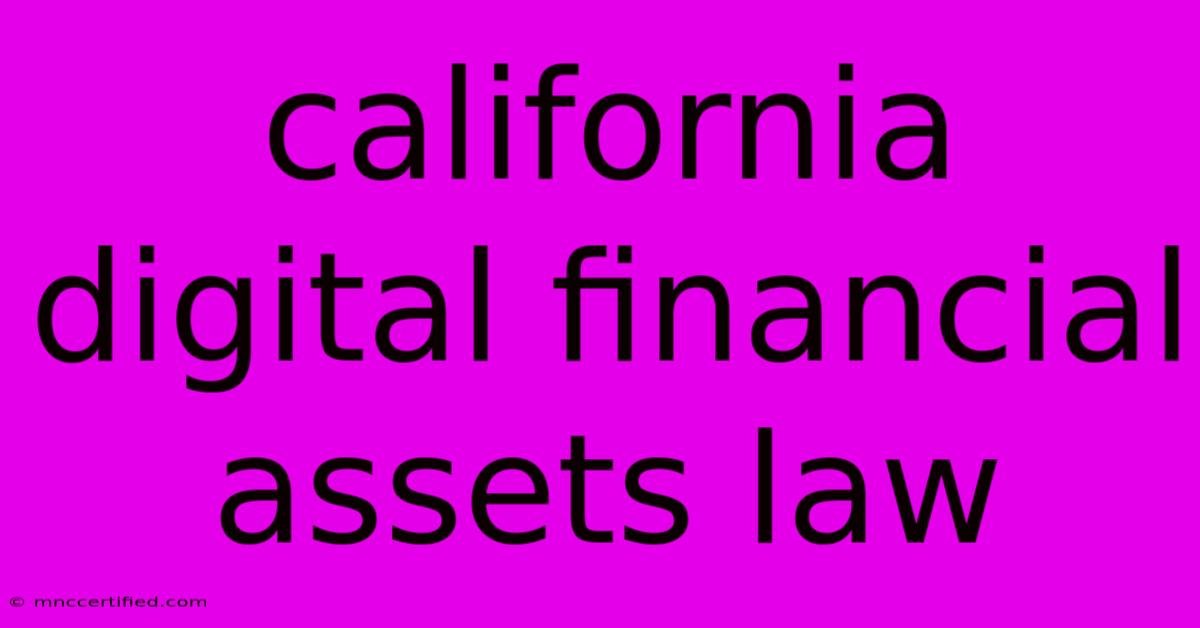California Digital Financial Assets Law

Table of Contents
California Digital Financial Assets Law: A Comprehensive Guide
California is at the forefront of the digital asset revolution, with its pioneering legislation aimed at regulating the burgeoning industry. The California Digital Financial Assets Law (CDAFLA), also known as Assembly Bill 395, came into effect in September 2020, offering a framework for the licensing and oversight of digital asset businesses operating within the state.
This comprehensive guide delves into the key provisions of the CDAFLA, exploring its impact on digital asset businesses, the types of licenses required, and the obligations imposed on licensees.
Understanding the California Digital Financial Assets Law
The CDAFLA's primary objective is to establish a regulatory environment for digital asset businesses, promoting consumer protection while fostering innovation within the industry. It does this by:
- Defining Digital Financial Assets: The law defines digital financial assets broadly, encompassing cryptocurrencies, stablecoins, and other digital representations of value.
- Establishing Licensing Requirements: It mandates that businesses engaged in activities involving digital financial assets, such as trading, custody, or investment advice, obtain specific licenses from the California Department of Financial Protection and Innovation (DFPI).
- Imposing Compliance Standards: The CDAFLA imposes strict compliance standards on licensees, requiring them to meet stringent capital adequacy, cybersecurity, and anti-money laundering (AML) requirements.
- Providing Consumer Protections: The law aims to protect consumers by requiring licensees to disclose risks associated with digital financial assets, provide clear terms and conditions, and safeguard customer funds.
Types of Licenses under the CDAFLA
The CDAFLA establishes four types of licenses for digital asset businesses:
- Digital Asset Exchange: This license applies to platforms facilitating the exchange of digital financial assets, such as crypto exchanges.
- Digital Asset Custodian: This license is for businesses holding digital financial assets on behalf of others, such as digital asset wallets.
- Digital Asset Broker-Dealer: This license applies to businesses that provide investment advice or facilitate transactions in digital financial assets on behalf of clients.
- Digital Asset Money Transmitter: This license is for businesses transmitting digital financial assets, including those offering payment processing services.
Obligations of Licensees under the CDAFLA
Licensees under the CDAFLA face a range of obligations, including:
- Maintaining Adequate Capital: Licensees must demonstrate sufficient capital reserves to mitigate financial risks.
- Implementing Strong Cybersecurity Measures: Robust cybersecurity protocols are essential to protect customer data and assets from cyber threats.
- Complying with AML Regulations: Licensees must adhere to AML regulations to prevent money laundering and other illicit financial activities.
- Maintaining Transparency and Disclosures: Licensees must provide clear disclosures to customers regarding risks, fees, and terms of service.
- Cooperating with the DFPI: Licensees are required to cooperate with the DFPI in investigations and audits.
Implications for Digital Asset Businesses
The CDAFLA represents a significant development for the digital asset industry in California. By providing a clear legal framework and licensing requirements, it promotes legitimacy, consumer protection, and responsible innovation.
For businesses operating in the digital asset space, it is crucial to understand the implications of the CDAFLA and ensure compliance with its provisions. This involves:
- Obtaining the appropriate license: Businesses should determine which license(s) they need based on their operations.
- Implementing compliance programs: Adhering to capital adequacy, cybersecurity, and AML regulations is essential.
- Maintaining transparency and disclosures: Clear communication with customers about risks and terms of service is paramount.
Conclusion
The California Digital Financial Assets Law is a groundbreaking piece of legislation shaping the future of the digital asset industry in the state. It promotes responsible innovation while safeguarding consumer interests, setting a high standard for regulatory oversight. By understanding the key provisions of the CDAFLA and taking necessary steps to comply, businesses can navigate the evolving regulatory landscape and contribute to the responsible growth of the digital asset ecosystem in California.

Thank you for visiting our website wich cover about California Digital Financial Assets Law. We hope the information provided has been useful to you. Feel free to contact us if you have any questions or need further assistance. See you next time and dont miss to bookmark.
Featured Posts
-
Barry Bonds San Francisco Giants Jersey
Nov 08, 2024
-
Driving Without Insurance In Pa Accident
Nov 08, 2024
-
How Much Is No Proof Of Insurance Ticket
Nov 08, 2024
-
After Scholz Coalition Fall Experts Weigh In
Nov 08, 2024
-
Palmetto Insurance Belton South Carolina
Nov 08, 2024